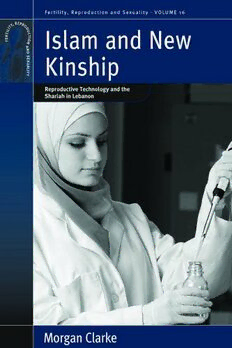
Islam and new kinship: reproductive technology and the shariah in Lebanon PDF
263 Pages·2009·1.195 MB·English
Most books are stored in the elastic cloud where traffic is expensive. For this reason, we have a limit on daily download.
Preview Islam and new kinship: reproductive technology and the shariah in Lebanon
Description:
"Islam and New Kinship presents a thoughtful and nuanced analysis of Islamic legal responses to issues raised by assisted reproductive technologies...Clarke engages in a thorough and captivating assessment of the numerous fatwas issued in the context of global Islamic legal scholarship concerning medical ethics, in particular, medically assisted conception...This book will be of considerable interest to scholars in the areas of gender and health, reproduction and reproductive technologies, Islamicists, and those engaged in comparative kinship studies. It would be a valuable and effective text for use in seminars and most appropriate for graduate students or advanced (honors) undergraduates." · Cont Islam "...a fascinating and well-written book...By thinking through anthropological and Islamic debates of assisted conception in a Middle Eastern setting, Islam and New Kinship is highly valuable for students and scholars interested in medical anthropology, kinship studies, Middle Eastern studies, as well as science and technology studies." · Social Anthropology/Anthropologie sociale "In this very detailed examination... Clarke presents a nuanced look at how both individuals and institutions interpret or manipulate Islamic teachings and concepts...the book represents an outstanding piece of scholarship for anyone interested in Islam, kinship, medical anthropology, or gender studies. Highly recommended." · Choice "This book is a mine of information, carefully researched and lucidly argued. It opens up a fascinating problematic (that is, a can of worms) that only Muslims (all Muslims, male and female) need seriously to address over the coming decades. The shape of future Muslim attitudes depends on the outcomes of this." · Journal of Beliefs and Values "An accomplished piece of work on several levels. Islam and New Kinship not only provides a detailed and nuanced account of how Islamic legal scholars and medical practitioners in Lebanon respond to new reproductive and genetic technologies, but also reveals what is missing from 'new' kinship studies. It is a compelling read and a must, not only for scholars of kinship and religion but for anybody with an interest in the rich complexity of contemporary Lebanese society." · Jeannette Edwards, University of Manchester Assisted reproductive technologies such as in vitro fertilization have provoked global controversy and ethical debate. This book provides a groundbreaking investigation into those debates in the Islamic Middle East, simultaneously documenting changing ideas of kinship and the evolving role of religious authority in the region through a combination of in-depth field research in Lebanon and an exhaustive survey of the Islamic legal literature. Lebanon, home to both Sunni and Shiite Muslim communities, provides a valuable site through which to explore the overall dynamism and diversity of global Islamic debate. As this book shows, Muslim perspectives focus on the moral propriety of such controversial procedures as the use of donor sperm and eggs as well as surrogacy arrangements, which are allowed by some authorities using surprising and innovative legal arguments. These arguments challenge common stereotypes of the rigidity and conservatism of Islamic law and compel us to question conventional contrasts between 'liberal' and Islamic notions of moral freedom, as well as the epistemological assumptions of anthropology's own 'new kinship studies'. This book will be essential reading for anyone interested in contemporary Islam and the impact of reproductive technology on the global social imaginary. Morgan Clarke completed his doctorate at the Institute of Social and Cultural Anthropology at the University of Oxford, and is now a British Academy Post-Doctoral Fellow in the Department of Social Anthropology at the University of Cambridge.
See more
The list of books you might like
Most books are stored in the elastic cloud where traffic is expensive. For this reason, we have a limit on daily download.
